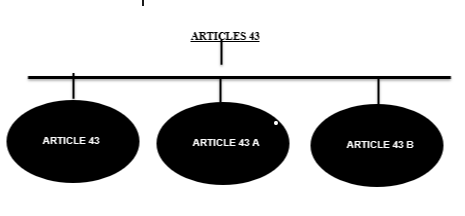The birth of Directive Principles of State Policy led to the development of social and economic conditions of the citizens to ensure a better life. This is possible only with the help of a successful running of the state. Behind every successful idea there is always an inspiration. Same goes for the Indian Constitution which was inspired by the Irish Constitution of 1937 which was borrowed from the Spanish Constitution and adopted the principles in the year 1978. Such ideas are evident in the Declaration of the Rights of Man and of the Citizen manifested by the Revolutionary France and the Declaration of Independence by the American Colonies. The general knowledge of the directive principles of state policy shall reveal how the scope of these guidelines or policies is limitless.
SOURCE OF INSPIRATION
|
|
|
General Knowledge
Article 45 of the Irish Constitution gave rise to the Directive Principles of State Policy. The rights of the citizens are protected by these guidelines or principles. The directive principles of state policy are present in the Articles 36 to 51 of Part IV of the Indian Constitution. The principles are related to the following;
Articles 43
The general knowledge says that there are three articles under Articles 43-
ARTICLES 43
|
|
|
Article 43
Article 43 assures work with a living wage, a fair life filled with leisure, social and cultural activities to all the workers or laborers. All these are secured either by the suitable legislations or economic organizations or other ways. Article 43 promotes cottage industries either independently or collaboratively in rustic and remote areas of the country. It also ensures proper conditions of work.
Article 43 A
The measures shall be taken for the elevation of the workers’ involvement in administration of commercial enterprises, establishments or other industrial organizations under Article 43 A. Forty-second Amendment Act, 1976 of the Indian Constitution added Article 43 A in the Constitution of India. The article empowers the State to launch suitable legislation or some other way in order to nurture the participation of the workers in managing the commercial undertakings. That Part VI of the Constitution of India which consists of the allocations of the Directive Principles of State Policy of India also consists of the Article 43 A.
During the emergency period of 25 June, 1975 to 21 March, 1977, Mrs. Indira Gandhi (the then head of the Indian National Congress) validated the Article 43 A. It is also known as the ‘mini-constitution’ as various changes were brought about in the Indian Constitution. There was also a huge controversy regarding this article that the amendments were made for personal ambitions of Indira Gandhi and was being termed as the ‘Constitution of Indira’.
ARTICLE 43-A REFERS TO THE PROCESS OF MANAGEMENT
Earlier, workers were only treated as the source of fabrication. With the passing time, a sense of attainment has grown regarding the truth that in order to have a successful growth in the economy of India, it is quite essential to have a factor of cooperation which is possible only through a promising better and fair life.
In this rat-race world, all are running to win. Similarly, the industrial competition has come to the limelight. In order to run a successful business, it is very much important to keep up the harmonious and peaceful environment. This is possible only through mutual and cooperative understanding between both the authority and the workers. The authority needs to listen to the workers’ decision as well because both the management and the workers need to respect each other’s equal rights.
The workers’ participation not only benefits the self but also the society. The scope of making decisions at various levels of hierarchy of the particular organizations with a huge sense of responsibility comes into the foreplay.
The two types of workers’ participation are-
Direct Participation
Indirect Participation
The various forms of participation according to Mr. Dale are-
Informational Participation
Advisory Participation
Constructive Participation
Joint Determination
The Ministry of Labor comprises a tripartite committee in order to check the progress of the whole idea and to rectify if the need arises.
Article 43 B
Being contained in Part IV of the Constitution of India, Article 43 B enhances the following-
Autonomous functioning
Democratic control
Professional management
Voluntary formation of cooperative societies.
Directive Principles of State Policy, being the ‘kernel of the Indian Constitution’, consists of Article 43 B which was amended by the ninety-seventh Amendment Act in the year 2011. It was done to enhance managing the cooperative societies along with the aid to people who are engaged in it.
Conclusion
General Knowledge reveals that the adoption of the Directive Principles of State Policy, adopted by the Constitution of India, was greatly influenced by the Irish Constitution of 1937 which was borrowed from the Spanish Constitution and adopted the principles in the year 1978. Such ideas are applicable in the Declaration of the Rights of Man along with the Citizen manifested with Revolutionary France and the Declaration of Independence by the American Colonies. Articles 43, 43-A and 43-B aim to promote the welfare of the workers with equal rights to fair wages and proper working conditions.
 Profile
Profile Settings
Settings Refer your friends
Refer your friends Sign out
Sign out







